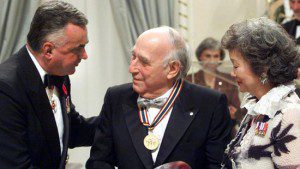
Sam Sniderman changed my Saturdays forever. Back in the 1960s, instead of sleeping in, savouring my coffee, wasting my morning, I high-tailed it downtown to Yonge and Dundas streets, to the store under the spinning-record sign to spend my money on vinyl. Yes, every Saturday morning I raced to take advantage of Sam’s door-crasher specials.
“The best music and the best prices,” Sam Sniderman used to say in his advertisements. But more than that, he also said, “Buy Canadian music because it’s the best.”
More than a customer, Sam Sniderman also made me a nationalist, because each Saturday morning when I joined the crowds crushing into the downtown Toronto “Sam the Record Man” to buy the latest, I zeroed in on Sam’s picks. That is, I bought the artists that Sam’s “hit list” recommended – artists such as Gordon Lightfoot, Joni Mitchell, the Guess Who and Lighthouse. It didn’t take much convincing. I was already sold on great troubadours, Yorkville folkies, rockers from Winnipeg and the fusion of rock and jazz in a modern big band. But Sam got me hooked on Canadian grooves. He showed me that Canadian artists had talent and in the process he built a business that became a national symbol.
Sam Sniderman died in his sleep on Sunday and I’m afraid with him went another piece of Canadian culture, enterprize and, yes, sovereignty. Once upon a time, we cared about showing the world Canada was different – different from such powerhouse cultures as the United States or Britain. There was a time we took great pride in our accomplishments – peacekeeping, multiculturalism, hockey dominance, universal health care, clean development of our natural resources, research and development, and our distinctive musical sound. In fact, Sam Sniderman helped ensure that Canadian sound got recorded and aired by supporting the introduction of 25 per cent Canadian content regulations to radio in 1971. I think NDP MP Andrew Cash got it right in the House of Commons this week.
“[Sam Sniderman] was an iconoclast, pioneer and staunch believer in the greatness of Canadian music,” Cash said.
And where are those staunch believers in Canada now?
They’re not in the NHL hockey arenas anymore. Ever since American lawyer Gary Bettman took over as commissioner of the league in 1993 and moved the headquarters to his hometown, New York, hockey has looked less and less Canadian. With the exception of the return of the Winnipeg Jets, Commissioner Bettman has seemed more intent on bringing our national winter game to such hockey hotbeds as Columbus, Ohio, Nashville, Tennessee, and Phoenix, Arizona – not Quebec City, Halifax, Saskatoon or Hamilton. At least north of the 49th Parallel we know the difference between icing and offside.
They’re not in the oil patch. Once upon a time, Canada owned its resources. Petro-Canada was a Crown corporation, owned and operated by Canadians. Not so now. Neither are most of the assets of the Alberta tar sands north of Fort McMurray; that sovereignty seems to be going down the river too. Indeed, the Harper government may well give its blessing to the purchase of the Canadian oil and gas company, Nexen, to the China National Offshore Oil Corporation. Do you think CNOOC will listen to Canadians upset with rising gas prices?
They don’t appear to be in the Department of Foreign Affairs either. Last month we learned that Canada’s 50-year-old legacy of leading the world in diplomacy was about to end. Foreign Affairs Minister John Baird decided the best way to deal with the rogue state of Iran was to close Canada’s embassy there. This week we learned that some of Canada’s diplomatic offices in other foreign capitals will henceforth be housed in British embassies. In other words, Canada appears to have reverted to its Mother country-loyal colony relationship with Britain. Lester Pearson, who established Canada as a peace broker during the Suez Crisis in 1956 and proposed the first ever UN peacekeeping force there, must be spinning in his grave at Baird’s decision to close the Tehran embassy and toss Iranian diplomats out of the country, especially when Iran may soon have nuclear capability.

I remember, about the same time I used to run to the Sam the Record Man store in downtown Toronto, the federal government initiated something called the Canadian Development Corporation. It was created in 1968 as an attempt to reduce foreign ownership of Canada. The idea was that average Canadians could invest in public companies operating in Canada. It would have allowed small shareholders – average Canadians – to invest in national industries, such as oil and gas, lumber, mining, and yes, cultural industries such as recording companies, studios, publishers, arts festivals and firms that promoted Canadian talent. Alas, the Mulroney government killed the CDC in 1986.
I know if I’d had more than $4.99, the cost of a Lighthouse LP back in 1968, I’d have invested it in the future of Canada.